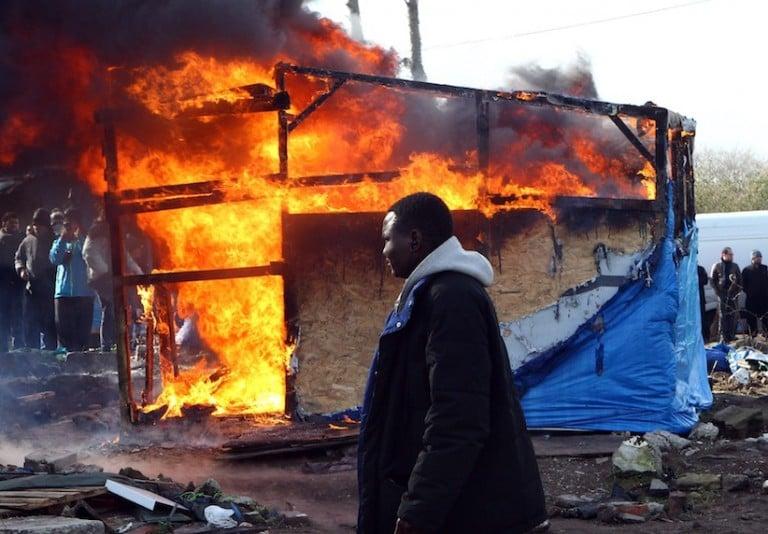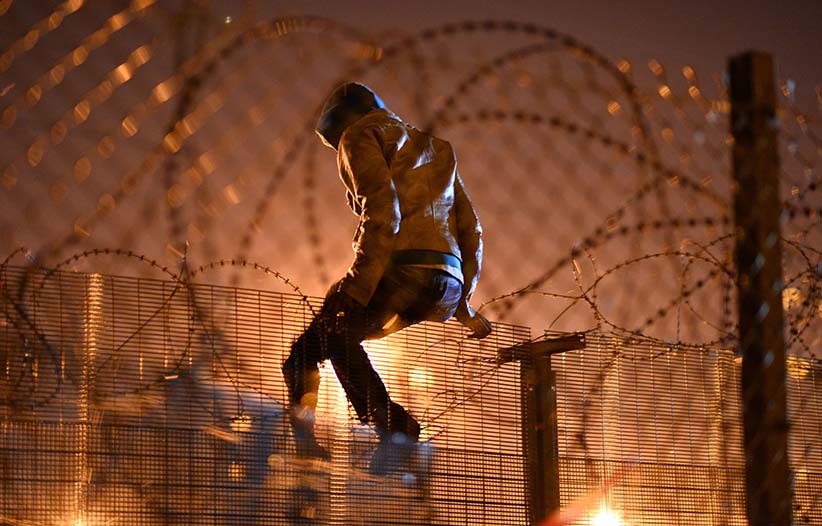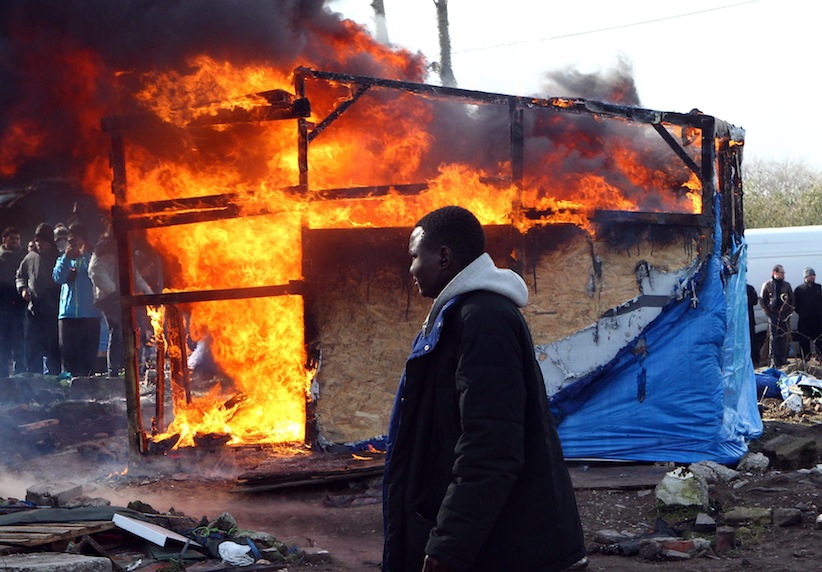Talking Brexit in the ‘Calais Jungle’
Inside the growing refugee camp, the referendum and anti-immigration sentiment in the U.K. is no deterrent at all

A migrant walks past a burning dwelling in the makeshift migrants camp near Calais, France in March, 2016. A destruction crew on Wednesday, March 16 tore down the last of more than 1,000 tents and huts in a large swath of a makeshift migrant camp in the French port city of Calais, a job marked by fiery protests, an ongoing hunger strike and several arrests. The prefecture, or state authority, which ordered the dismantling of the southern sector of the camp – a veritable village on 7.5 hectares (18.5 acres) of land – said workers guarded by police finished pulling down the flimsy dwellings at 2 p.m. Wednesday, less than three weeks after the job began. (AP Photo/Michel Spingler, file)
Share

Fatima arrived in the Calais Jungle migrant camp on Saturday. The 28-year-old left Sudan’s Darfur months ago, following an arduous route through Egypt and Italy, before navigating her way across Europe. After her first solid night’s sleep in months, she awoke to contemplate the final hurdle before her. Fatima’s brother is in the U.K. and she plans on reaching him: how, she hasn’t yet worked out, though it’s clear that borders don’t always stop her.
Thursday’s vote in Britain will be a historic first, with long-lasting and still mostly incomprehensible implications. If the U.K. becomes the first state to leave the European Union, Brexit proponents promise Britain can become great again, with all the vagueness that encompasses. Those on the Remain side warn of economic suicide.
Campaigning has largely hinged on two main issues: immigration and the economy. The increasingly vitriolic rhetoric used by Leave campaigners when talking about the so-called European migration crisis—which has seen more than a million refugees and migrants cross the sea to Europe since last year—has prompted comparisons between the UK Independence Party’s latest posters and Nazi propaganda. Meanwhile, French president Francois Hollande has threatened that makeshift refugee camps will move from the shores of France to Kent if the U.K. does opt to exit.
However, in the port town of Calais—the focal point of much of the U.K.’s migration debate—those attempting nightly to jump on trains and trucks have little awareness of the upcoming referendum or the outcry around it, and a deep-rooted doubt they’ll feel any implications.
Calais, once known as the “last jewel in the British crown” before it was recaptured by France in the 16th century, has now become synonymous with illegal immigration to the U.K. Clearances ordered by French authorities earlier this year saw large portions of the informal Jungle camp bulldozed, prompting tense scenes where shelters were set on fire and a group of Iranian men sewed their lips together in protest. However, those episodes seem quickly forgotten; 30 migrants and refugees continue to arrive every day, according to aid workers, while the camp’s total population is back above 6,000.
Yet the debate around the EU referendum feels far removed. The thousands who have escaped war, poverty or dictatorships in the Middle East and Africa operate in something of an information black hole, quite aware that their legal right to come to the U.K. is non-existent anyway. Instead, their focus is trained on the best way to cross the border illegally, by boarding trucks or trains or ferries, while avoiding police brutality and those who prey on the vulnerable within the camp.

“There’s an election on Thursday?” On the Jungle’s main thoroughfare, Abdul Khan runs a general shop with two friends. He’s from Nangarhar, Afghanistan, and has been in the Jungle for six months. They buy their supplies from the local Lidl supermarket, and earn about $70 profit each day—meaning they are better off than most of their peers. For sale are cans of Red Bull, packets of biscuits, Marlboro Reds for $10 a packet, or home-rolled Jungle cigarettes at $1.45 for nine. Khan said he tries to reach the U.K. every day. He hadn’t heard of the EU referendum or MP Jo Cox’s killing last week, but a mention of far-right group Britain First provoked a response—he thinks he’s seen their videos.
Three migrants have died in the last few months, hit by cars on the motorway, Khan lamented—though these deaths regularly go unreported. He described a collection to raise the money needed to send the bodies back home to their families. Dozens have perished during the past year while trying to cross to England, including a 15-year-old who suffocated in a truck in January.
There are as many as 500 unaccompanied minors in the Jungle camp, according to aid groups. These include Aasif, a 12-year-old who asked that his real name not be used. He’s living in one of the government-provided shipping containers reserved specifically for minors, though even that added protection doesn’t mean he feels safe. He left Afghanistan last July, after his parents died, he said. As the eldest child, an uncle paid his way with the suggestion he try and study medicine in England.
Sixteen-year-old Hasib claimed he wants to give fingerprints for an asylum claim, but said French authorities have insisted he travel to another city to do it, something he’s apprehensive about. His family paid his way to Europe after the Taliban tried to recruit him, Hasib said, while claiming his identity papers caught fire during a fight last month between the camp’s Sudanese and Afghan communities. The evidence of this conflict can be seen in the charred shell of a wooden shelter, which a Sudanese community leader pointed out. Mussa Mahdy, a 65-year-old textile engineer from Darfur, said 41 people were injured during the clashes.
Mahdy has been in Calais for three months. While he’s relatively well-informed about EU immigration law, he didn’t know anything about the referendum, but was highly critical of the U.K. for getting involved in conflicts abroad and then not dealing with the consequences, as he put it. In Sudan “all my people are dead or in prison,” Mahdy said.
Some of those living in the main camp are ready to give up. Hane, a 24-year-old from Eritrea with pink hair, pink and blue nails, and a bright yellow shirt, has spent 10 months in the Jungle. On Sunday she packed up her meagre belongings in preparation for a move to another, smaller camp a short distance away, where around 300 people live in even poorer conditions. She said she’s faced “too many problems” in the Jungle. “Maybe some guy is drinking. He wants to touch you. He wants to have sex with you.” Hane had been trying to reach her mother in England.
Others said they had tried to claim asylum, but been rebuffed. Hijra Ullah Khaxotai, a 27-year-old from Kabul, left Afghanistan one year ago. He said he approached police outside a Paris train station in Paris, but they dismissed him, telling him to leave their sight quickly. He’s now been in Calais for 15 days and already knows three people who’ve successfully reached the U.K., though his own attempts have proved futile. “U.K. is a peaceful country, a good country,” Khaxotai said, but mainly he can’t work out how to get anywhere else: ideally he’d return to Russia.
Meanwhile, back in the Jungle’s schoolroom, an outpost and the lone survivor of the widespread clearances at the back entrance to the camp, 18 African men were taking English classes in preparation for what they hope will be a new life. They listed off the names of wild animals: a crocodile, a monkey, a snake. On the whiteboard in front of them were scrawled verbs: to like, to eat, to drive, to know. As she spoke in a soft brogue, their blonde Irish teacher gripped a half-inflated globe. A map of Europe hung on the wall, borders clearly delineated; beside it was Vincent Van Gogh’s Wheatfield With Crows. One of the artist’s last works, it portrays an isolated, foreboding scene marked by a stormy sky.